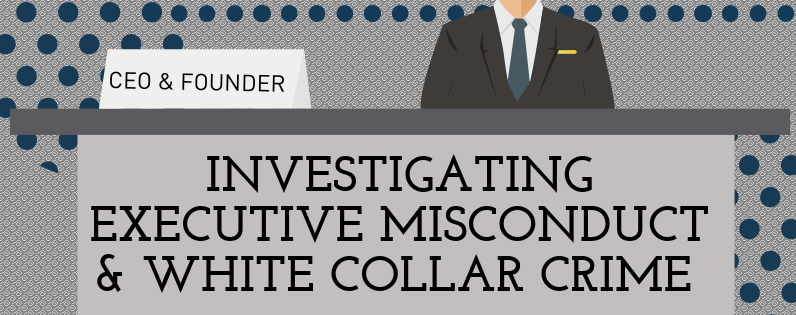Is Your Business Falling Prey to the Employee Fraud Epidemic?
Imagine, if you will, that you’re a mid-level manager, and you’ve had an eye on Bob for a while. Bob’s always struck you as an easy going family guy, but recently you’ve noticed that his behaviour has become a little strange. Bob’s clothes are a little more flashy and you noticed a brand new wristwatch […]
When a Reckoning Arrives: Navigating Employee Theft or Fraud

You’ve just pulled the trigger on hiring a bright and bold new employee, and you couldn’t be more excited. On paper, they are everything that your organization’s been looking for—and the decision to welcome them into your team comes with an implicit trust and vulnerability. So it can be difficult to imagine that such a […]
Investigating Executives & White Collar Crime

Don’t let executive misconduct ruin your corporation… When it comes to running a business, the executives who are the visionaries and decision-makers that shape a company should always remain above reproach. White collar crimes have the potential to pull a business up from the root with devastating consequences. Unfortunately, Americans know from media coverage and […]
Phishers Want Your Direct-Deposit
The invention of direct-deposit payments in electronic banking have likely saved companies millions of dollars over the years in labor hours, materials, and fees that previously caused problems for companies. However, in an age where your paycheck is sent automatically to your checking account, phishers are seeking to exploit this automation for personal gain. The […]
Top 5 Most Common Frauds in 2019
Being a responsible consumer in the year 2019 means educating yourself—not just on the products and services—but of the ways scammers and thieves exploit consumer behavior for their own financial gain. As technology advances with the convenience of SMS text messaging as a security feature, financial applications that put your finances at your fingertips, and […]
Investigating Non-Compete Violations
When growing a business, executives and owners have to go the extra mile when it comes to protecting trade secrets. In the pursuit of their company’s business, a common practice for corporations of all sizes is implementing non-compete clauses in their employees’ contracts. This ensures, should an employee leave the company for any reason, they […]
SIM Card Swapping Scams Leave Businesses Vulnerable
Smartphones have become such an integral part of our everyday lives that many users joke their devices have become grafted to their hands. We use them to maintain contact in our work and personal lives, correspond through email and social media, and a bulk of Americans have made the transition to conducting their banking through […]
Catfish: Romance Scams in 2019
Those who met their current significant other in an age before the internet often have a difficult time understanding courtship rituals in the year 2019. Even Gen-Xers who are navigating the single-scape are having trouble adjusting to the way social media and dating apps have changed the way relationships are formed in the United States. […]
ShutDown: Consumer Fraud Investigations Halted

Using a CNC to Protect Your Business
If you own your own business, you know finding the right people to build your company is vital. One “weak link in the chain,” as they say, can tear a business down to its foundation. And as such, it’s not only important to hire the right people, but also protect your business from being exploited […]